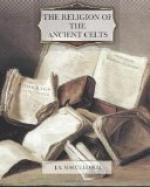CHAPTER II.
THE CELTIC PEOPLE.
Scrutiny reveals the fact that Celtic-speaking peoples are of differing types—short and dark as well as tall and fairer Highlanders or Welshmen, short, broad-headed Bretons, various types of Irishmen. Men with Norse names and Norse aspect “have the Gaelic.” But all alike have the same character and temperament, a striking witness to the influence which the character as well as the language of the Celts, whoever they were, made on all with whom they mingled. Ethnologically there may not be a Celtic race, but something was handed down from the days of comparative Celtic purity which welded different social elements into a common type, found often where no Celtic tongue is now spoken. It emerges where we least expect it, and the stolid Anglo-Saxon may suddenly awaken to something in himself due to a forgotten Celtic strain in his ancestry.
Two main theories of Celtic origins now hold the field:
(1) The Celts are identified with the progenitors of the short, brachycephalic “Alpine race” of Central Europe, existing there in Neolithic times, after their migrations from Africa and Asia. The type is found among the Slavs, in parts of Germany and Scandinavia, and in modern France in the region of Caesar’s “Celtae,” among the Auvergnats, the Bretons, and in Lozere and Jura. Representatives of the type have been found in Belgian and French Neolithic graves.[6] Professor Sergi calls this the “Eurasiatic race,” and, contrary to general opinion, identifies it with the Aryans, a savage people, inferior to the dolichocephalic Mediterranean race, whose language they Aryanised.[7] Professor Keane thinks that they were themselves an Aryanised folk before reaching Europe, who in turn gave their acquired Celtic and Slavic speech to the preceding masses. Later came the Belgae, Aryans, who acquired the Celtic speech of the people they conquered.[8]
Broca assumed that the dark, brachycephalic people whom he identified with Caesar’s “Celtae,” differed from the Belgae, were conquered by them, and acquired the language of their conquerors, hence wrongly called Celtic by philologists. The Belgae were tall and fair, and overran Gaul, except Aquitaine, mixing generally with the Celtae, who in Caesar’s time had thus an infusion of Belgic blood.[9] But before this conquest, the Celtae had already mingled with the aboriginal dolichocephalic folk of Gaul, Iberians, or Mediterraneans of Professor Sergi. The latter had apparently remained comparatively pure from admixture in Aquitaine, and are probably the Aquitani of Caesar.[10]




